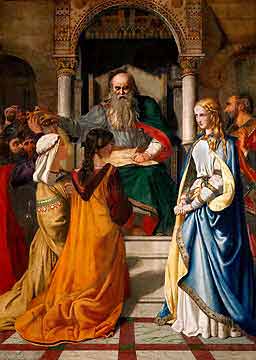
It's that time of the semester where I have to decide what I want the focus of my blog to be. As is probably obvious, my blog thus far has been all over the map, and it has been really difficult to decide on one theme for the rest of the class. There are so many things I could write about. However, I really enjoyed writing one of my most recent posts, "Miranda: chaste, silent, and obedient?" and I think I will focus on women in Shakespeare.
I've heard throughout my journey as an undergraduate that Shakespeare is chauvinist and his female characters reflect his bias, but I feel that my experience this semester gives me the opposite opinion. So far, in almost all of the plays that I've read, there has always been at least one female character that doesn't quite fit the mold of the silent, chaste and obedient women sterotypical of the Elizabethan era. Hamlet has Ophelia (who does obey her father and brother, but in the end commits the ultimate form of disobedience by killing herself), King Lear has Cordelia, Regan, and Goneril (Cordelia doesn't give in to her father's bullying, while her sisters completely reject the patriarchal society and rule the country themselves), The Taming of the Shrew has Katharina (who speaks for herself), and The Tempest has Miranda (whom I've already written about) and Ariel (who has more power than anyone but Prospero).
I'm interested in examining how strong females may have played a role in Shakespeare's life personally: his mother, his wife, daughters, and even Queen Elizabeth herself. I feel this may have influenced his writing, particularly when he gives female characters any sort of power over men, like Lady Macbeth, Ariel, Bianca, and Lear's daughter's. To support this idea, I went looking at the library, browsing the incredible mass that is the Shakespeare section. I found tons of great sources, one of which is Shakespeare and Women by Phyllis Rackin. She makes several keys points that reveal a lot about what influenced Shakespeare's writing.
1. Shakespeare lived a very female-oriented environment as a child. Rackin says, "Because most of the women in Shakespeare's family outlived their brothers and husbands, the family in which he grew up was actually predominantly female" (33).
2. Women in Shakepeare's life were influential and powerful. "Women in Shakespeare's family controlled considerable property both in land and in money" and Shakespeare's mother Mary was an heiress in her own right, making her "social status distinctly superior" to that of her husband's (34).
3. Women were also important from an economic stance. "The collective economic power they possessed as paying customers in the playhouse meant that none of Shakepeare's plays could have been successful in his own time if it failed to please them" (47).
Taking these ideas into account, it seems as though the existing feminist criticism of Shakespeare is somewhat one-sided in accusing the bard of maltreating his female characters by giving them stale, two-dimensional characters that only exhibit traits approved by the society he was writing for. I want to argue that perhaps he was the exact opposite, arguably even a proto-feminist, by writing such strong and willful female characters. Whether he was influenced by the strong female presences in his life or simply by economic factors, it remains that he wrote to accomodate a female audience.
Keep in mind that this is my first attempt at defining my blog's focus, and that these thoughts will likely change over the next few weeks. That said, please feel free to comment away! I'm very open to ideas and would love any suggestions.
Works Cited
Rackin, Phyllis. Shakespeare and Women. New York: Oxford University Press, 2005.






